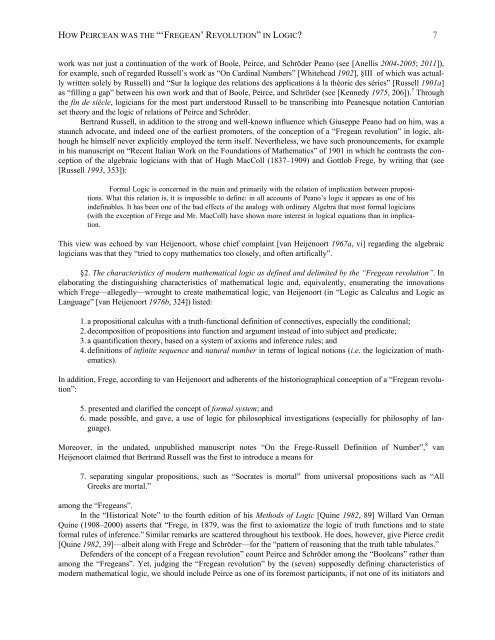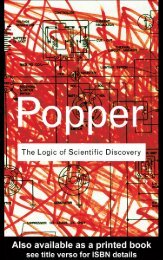Create successful ePaper yourself
Turn your PDF publications into a flip-book with our unique Google optimized e-Paper software.
HOW PEIRCEAN WAS THE “‘FREGEAN’ REVOLUTION” IN LOGIC? 7<br />
work was not just a continuation of the work of Boole, Peirce, and Schröder Peano (see [Anellis 2004-2005; 2011]),<br />
for example, such of regarded Russell’s work as “On Cardinal Numbers” [Whitehead 1902], §III of which was actually<br />
written solely by Russell) and “Sur la logique des relations des applications à la théorie des séries” [Russell 1901a]<br />
as “filling a gap” between his own work and that of Boole, Peirce, and Schröder (see [Kennedy 1975, 206]). 7 Through<br />
the fin de siècle, logicians for the most part understood Russell to be transcribing into Peanesque notation Cantorian<br />
set theory and the logic of relations of Peirce and Schröder.<br />
Bertrand Russell, in addition to the strong and well-known influence which Giuseppe Peano had on him, was a<br />
staunch advocate, and indeed one of the earliest promoters, of the conception of a “Fregean <strong>revolu</strong>tion” in logic, although<br />
he himself never explicitly employed the term itself. Nevertheless, we have such pronouncements, for example<br />
in his manuscript on “Recent Italian Work on the Foundations of Mathematics” of 1901 in which he contrasts the conception<br />
of the algebraic logicians with that of Hugh MacColl (1837–1909) and Gottlob Frege, by writing that (see<br />
[Russell 1993, 353]):<br />
Formal Logic is concerned in the main and primarily with the relation of implication between propositions.<br />
What this relation is, it is impossible to define: in all accounts of Peano’s logic it appears as one of his<br />
indefinables. It has been one of the bad effects of the analogy with ordinary Algebra that most formal logicians<br />
(with the exception of Frege and Mr. MacColl) have shown more interest in logical equations than in implication.<br />
This view was echoed by van Heijenoort, whose chief complaint [van Heijenoort 1967a, vi] regarding the algebraic<br />
logicians was that they “tried to copy mathematics too closely, and often artifically”.<br />
§2. The characteristics of modern mathematical logic as defined and delimited by the “Fregean <strong>revolu</strong>tion”. In<br />
elaborating the distinguishing characteristics of mathematical logic and, equivalently, enumerating the innovations<br />
which Frege—allegedly—wrought to create mathematical logic, van Heijenoort (in “Logic as Calculus and Logic as<br />
Language” [van Heijenoort 1976b, 324]) listed:<br />
1. a propositional calculus with a truth-functional definition of connectives, especially the conditional;<br />
2. decomposition of propositions into function and argument instead of into subject and predicate;<br />
3. a quantification theory, based on a system of axioms and inference rules; and<br />
4. definitions of infinite sequence and natural number in terms of logical notions (i.e. the logicization of mathematics).<br />
In addition, Frege, according to van Heijenoort and adherents of the historiographical conception of a “Fregean <strong>revolu</strong>tion”:<br />
5. presented and clarified the concept of formal system; and<br />
6. made possible, and gave, a use of logic for philosophical investigations (especially for philosophy of language).<br />
Moreover, in the undated, unpublished manuscript notes “On the Frege-Russell Definition of Number”, 8 van<br />
Heijenoort claimed that Bertrand Russell was the first to introduce a means for<br />
7. separating singular propositions, such as “Socrates is mortal” from universal propositions such as “All<br />
Greeks are mortal.”<br />
among the “Fregeans”.<br />
In the “Historical Note” to the fourth edition of his Methods of Logic [Quine 1982, 89] Willard Van Orman<br />
Quine (1908–2000) asserts that “Frege, in 1879, was the first to axiomatize the logic of truth functions and to state<br />
formal rules of inference.” Similar remarks are scattered throughout his textbook. He does, however, give Pierce credit<br />
[Quine 1982, 39]—albeit along with Frege and Schröder—for the “pattern of reasoning that the truth table tabulates.”<br />
Defenders of the concept of a Fregean <strong>revolu</strong>tion” count Peirce and Schröder among the “Booleans” rather than<br />
among the “Fregeans”. Yet, judging the “Fregean <strong>revolu</strong>tion” by the (seven) supposedly defining characteristics of<br />
modern mathematical logic, we should include Peirce as one of its foremost participants, if not one of its initiators and





